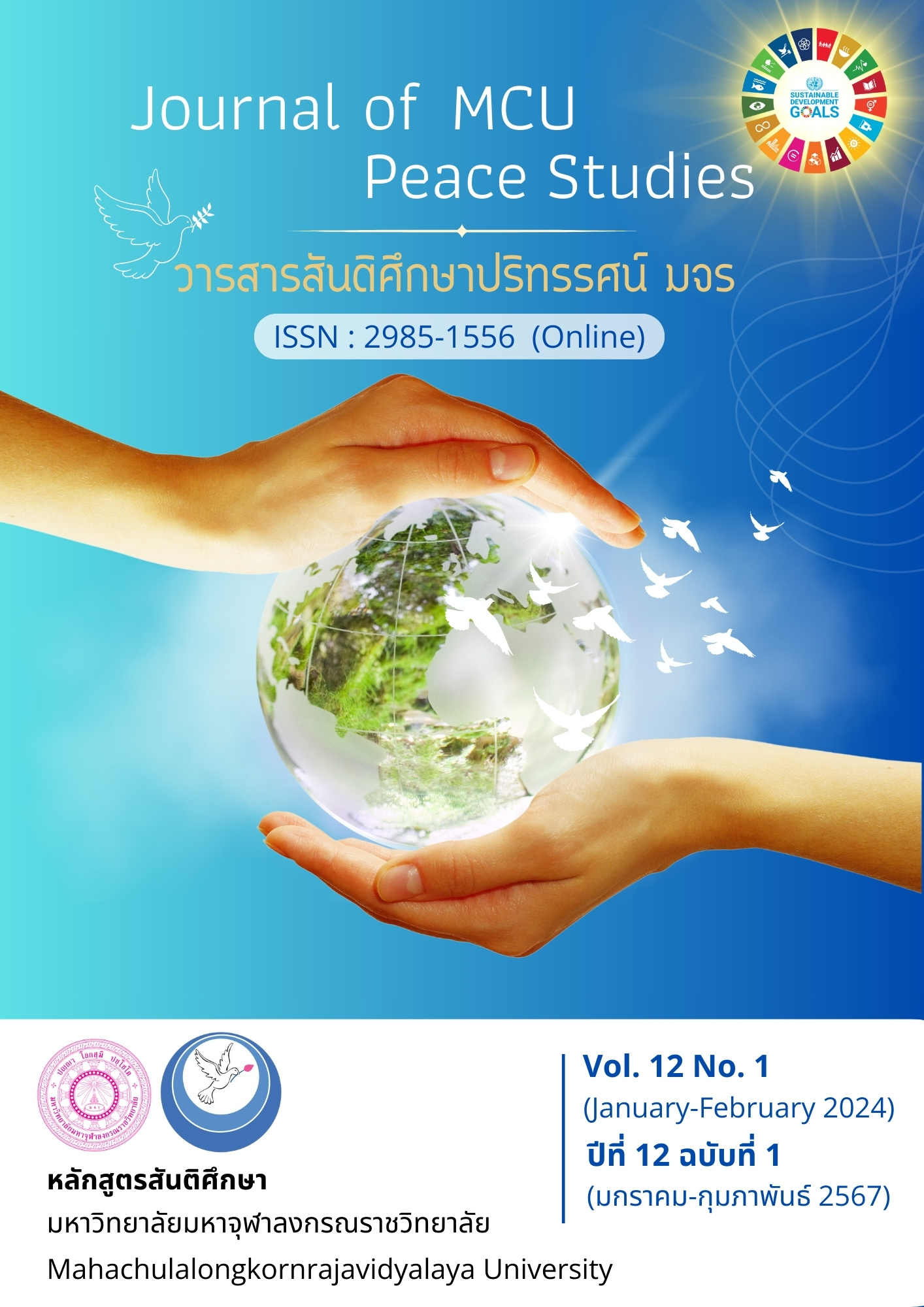การพัฒนาความสามารถในการแก้ปัญหาในสถานการณ์การแพร่ระบาดโควิด-19 ของนักเรียนชั้นมัธยมศึกษาปีที่ 4 เรื่อง งานและพลังงาน โดยการจัดการเรียนรู้แบบสตีมศึกษา
Main Article Content
บทคัดย่อ
บทความวิจัยนี้มีวัตถุประสงค์เพื่อ 1) สร้างแผนการจัดการเรียนรู้แบบสตีมศึกษา เรื่อง งานและพลังงาน ให้มีประสิทธิภาพตามเกณฑ์ 80/80 2) เปรียบเทียบความสามารถในการแก้ปัญหาของนักเรียนก่อนเรียนและหลังเรียน 3) เปรียบเทียบผลสัมฤทธิ์ทางการเรียนของนักเรียนก่อนเรียนและหลังเรียน และ 4) ศึกษาความพึงพอใจของนักเรียนต่อการจัดการเรียนรู้แบบสตีมศึกษา กลุ่มตัวอย่างที่ใช้ในการวิจัย คือ นักเรียนชั้นมัธยมศึกษาปีที่ 4/2 ภาคเรียนที่ 2 ปีการศึกษา 2565 โรงเรียนดงมะไฟวิทยา สังกัดสำนักงานเขตพื้นที่การศึกษามัธยมศึกษาสกลนคร จำนวน 26 คน โดยการสุ่มตัวอย่างแบบกลุ่ม เครื่องมือที่ใช้ในการวิจัย ได้แก่ 1) แผนการจัดการเรียนรู้แบบสตีมศึกษา 2) แบบทดสอบวัดความสามารถในการแก้ปัญหา 3) แบบทดสอบวัดผลสัมฤทธิ์ทางการเรียน และ 4) แบบสอบถามความพึงพอใจ สถิติที่ใช้ในการวิเคราะห์ข้อมูล ได้แก่ ร้อยละ ค่าเฉลี่ย ส่วนเบี่ยงเบนมาตรฐาน และสถิติทดสอบค่าทีแบบกลุ่มตัวอย่างที่ไม่เป็นอิสระต่อกัน
ผลการวิจัยพบว่า 1) แผนการจัดการเรียนรู้แบบสตีมศึกษา เรื่อง งานและพลังงาน มีประสิทธิภาพเท่ากับ 81.48/80.27 ซึ่งเป็นไปตามเกณฑ์ 80/80 ที่กำหนดไว้ 2) ความสามารถในการแก้ปัญหาของนักเรียนหลังเรียนสูงกว่าก่อนเรียน อย่างมีนัยสำคัญทางสถิติที่ระดับ .01 3) ผลสัมฤทธิ์ทางการเรียนของนักเรียนหลังเรียนสูงกว่าก่อนเรียน อย่างมีนัยสำคัญทางสถิติ ที่ระดับ .01 4) ความพึงพอใจของนักเรียนต่อการจัดการเรียนรู้แบบสตีมศึกษา อยู่ในระดับมากที่สุด ( = 4.70)
Article Details

อนุญาตภายใต้เงื่อนไข Creative Commons Attribution-NonCommercial-NoDerivatives 4.0 International License.
ทัศนะและความคิดเห็นที่ปรากฏในบทความในวารสาร ถือเป็นความรับผิดชอบของผู้เขียนบทความนั้น และไม่ถือเป็นทัศนะและความรับผิดชอบของกองบรรณาธิการ ยินยอมว่าบทความเป็นลิขสิทธิ์ของวารสาร
เอกสารอ้างอิง
Boonphak, K. (2020). Review Article on Learning Learning Management in the New Normal Era. Journal of Industrial Education, 19(2), 1-6.
Buaphan, M., Jaradrawiwat, S., & Jenjit, A. (2020). Effects of Learning Management by Using STEAM on Learning Achievement, Creative Thinking and Attitude of Prathomsuksa 4 Students. Journal of Education Studies, 48(2), 203-224.
Chimkul, A., Kaewdee, S., & Disyatat, N. R. (2017). Effects of Biology Learning Management based on the STEM Education Approach on Problem-Solving Ability and Biology Learning Achievement of Upper Secondary. An Online Journal of Education, 12(1), 324-342.
Dongmafaiwittaya School. (2020). School Curriculum of Dongmafaiwittaya School. Sakon Nakhon: Academic Department of Dongmafai Wittaya School.
Intavimolsri, S., Kaewdee, S., & Pattaradilokrat, S. (2019). Effects of Using the STEAM Education Approach in Biology on Scientific Creativity and Learning Achievement of Tenth Grade Students. Journal of Education Studies, 47(2), 410-429.
Jampong, M., & Prammanee, N. (2017). The Development of Work Creation through STEAM Education Approach on Energy. EAU Heritage Journal Social Science and Humanity, 7(3), 81-92.
Khamhaengpol, A., Sriprom, M., & Chuamchaitrakool, P. (2021). Development of STEAM Activity on Nanotechnology to Determine Basic Science Process Skills and Engineering Design Process for High School Students. Thinking Skills and Creativity, 39, 1-7.
Kuaklung, K., Kessaratikoon, P., & Prasitpong, S. (2018). The Study of Archivement by STEM Education on Equilibrium and Elasticity for Grade 11 Students. Journal of Education Thaksin University, 18(2), 124-135.
Office of the Education Council. (2017). The National Scheme of Education B.E. 2560-2579 (2017-2036). Bangkok: Prikwan Graphic.
Office of the National Economic and Social Development Council. (2017). Summary of the Twelfth National Economic and Social Development Plan (2017-2021). Bangkok: Office of the National Economic and Social Development Council.
Seejantuek, S., Phaksunchai, M., & Panpae, K. (2022). The Effects of STEAM Education on Problem Solving Skills in Elements and Compounds of Mathayomsuksa 4 Students. Journal of Educational Technology and Communications, 5(16), 19-31.
Sriboon, S., & Pongen, W. (2019). The Learning Outcomes of STEAM Education based on Problem Based Learning to Developing Mathematical Skills and Process for Seventh Grade Students. Journal of Education Studies, 47(1), 526-543.
Sriwibunrat, T., & Onthenee, A. (2019). A Development of Learning Activities by Using STEM Education to Enhance Problem-Solving Ability on Work and Energy in Physics for Grade 10 Students. Humanity and Social Science Journal, 25(2), 197-207.
Sung, E. (2017). The Influence of Visualization Tendency on Problem-solving Ability and Learning Achievement of Primary School Student in South Korea. Thinking Skills and Creativity, 26, 168-175.
Tayea, F., Mophan, N., & Waedrama, M. (2017). Effect of STEAM Education on Science Learning Achievement, Creative Thinking and Satisfaction of Grade 5 Studentstowards the Learning Management. Princess of Naradhiwas University Journal of Humanities and Social Sciences, 4(2), 1-14.
Thammayod, A., Khamhaengpol, A., & Pansuppawat, T. (2022). Development of Creative Thinking of Mathayomsuksa 2 Students on the Topic of Separation of Substances Using STEAM Education combined with the Philosophy of Sufficiency Economy. Journal of MCU Peace Studies, 10(1), 142-159.
The Institute for the Promotion of Teaching Science and Technology (IPST). (2017). The Curriculum Manual of Additional Science Subjects. Bangkok: Ministry of Education.
The Institute for the Promotion of Teaching Science and Technology (IPST). (2019). PISA 2018 Results : Executive Summary. Bangkok: Ministry of Education.
Wongthong, P. (2020). Integrated Steam Education Teaching Practice for Improving Critical Thinking and Problem Solving Abilities of First Grade Students in Small Primary School. Journal of Education Khon Kaen University, 43(2), 3-16.


